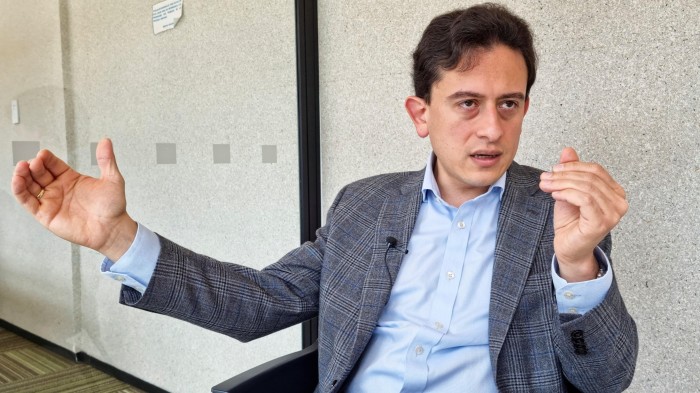Colombia seeks renegotiation of investment treaty with the UK

Unlock the Editor’s Digest for free
Roula Khalaf, Editor of the FT, selects her favourite stories in this weekly newsletter.
Colombia is seeking to renegotiate the terms of its bilateral investment treaty with the UK over concerns the deal favours foreign companies over the state, its trade minister said.
The pair struck an agreement in 2014 to foster closer ties that allows either side to cancel after 10 years.
“We have decided not to ask for that cancellation, but also stating that we consider a renegotiation to be important,” trade minister Luis Carlos Reyes told the Financial Times.
Fruits and vegetables, coal, and coffee made up the bulk of Colombia’s £852mn exports to the UK in the 12 months to July this year, while British exports were worth £1.1bn, led by pharmaceutical products, industrial machinery and whisky.
“Colombia greatly values all aspects of its bilateral relations with the United Kingdom, including the investment that comes from there to here and its contribution to our country’s economic growth,” the minister said.
But he voiced concerns over a clause in the current arrangement that sees any disputes between British companies and the Colombian state sent to an arbitration panel that Colombia argues often favours corporates.
The investor-state dispute settlement process allows companies to sue the Colombian government if they believe they have been treated unfairly, with cases sent to international courts. Colombia has faced 23 ISDS claims over the past 10 years, including three by UK investors using the existing treaty.
Claims have included mining companies Glencore and Anglo American, with projects disrupted by disputes over indigenous community rights and environmental protections.
“We are of the conviction that all democratic states have legitimacy over what is convenient for companies,” Reyes added.
“We are convinced that the Colombian justice system has the tools to guarantee investors all reasonable protections and due process for the protection of their rights and we want to move in that direction [with the UK treaty] and in general in the other agreements in which Colombia participates.”
Reyes comments come as foreign direct investment has fallen for seven consecutive months, according to the central bank, and economists have warned about the country’s widening fiscal deficit. Scandal is also hampering President Gustavo Petro’s economic agenda, with his second finance minister Ricardo Bonilla resigning this month amid a corruption probe.
A recent case between a GSK subsidiary ViiV Healthcare and Colombia’s regulators tested relations at a time when Petro, Colombia’s first leftist president, is attempting to expand the state’s role in the nation’s healthcare.
In April, antitrust and healthcare regulators in Colombia granted a compulsory licence for production of the company’s antiretroviral HIV medicine dolutegravir, which in effect lifted ViiV Healthcare’s patent on the drug.
The International Centre for Settlement of Investment Disputes in Washington, which is considering the case, has yet to rule on the matter, though the Andean Community’s separate dispute mechanism ruled in favour of Colombia last month.
“The compulsory licences that [Colombia] can generate basically allow the production of generic drugs when a serious health situation warrants it,” Reyes said.
“This is something that Brazil has been doing for decades with HIV drugs, so what Colombia is seeking in its international investment agreement policy is to be treated as an equal in relations with other countries.”
The British-Colombian Chamber of Commerce in Colombia has warned that attempting to renegotiate the treaty could lead Britain to cancel the existing agreement, while putting off investors that have long viewed Colombia as a stable place to invest.
“We think that [a renegotiation of the treaty] is not convenient, and could affect contract stability for British companies and Colombia,” said Jaime González Moore, the chamber’s president. “It would be an invitation to British investors to look at places other than Colombia.”
Last month, UK trade minister Douglas Alexander said the treaty played an “important role in the investment relationship between our two countries”.
He added it “contains legally binding investment protection commitments which ensure UK and Colombian investors are treated in line with the rule of law, and are protected against unfair, arbitrary or discriminatory treatment, and expropriation without adequate compensation.”
Reyes denied that such a renegotiation would affect the stability required of investors, as Colombia’s legal system is robust enough to settle any disputes in a fair and transparent manner.
The uncertainties over the treaty come amid a rare spat between London and Bogotá, after the UK last month announced the reimposition of visas for Colombian tourists — two years after the measure was removed — after an increase in falsified asylum claims from visiting Colombians.
President Petro has warned that Colombia will require visas of British tourists unless the decision is reversed.
In a recent speech he warned: “Sometimes I wonder if the King of England today and his Labour party government, which should represent the flags of equality and freedom, are not again like the slave owners in thinking that Colombians are inferior and that is why they are issuing a visa.”
#Colombia #seeks #renegotiation #investment #treaty




